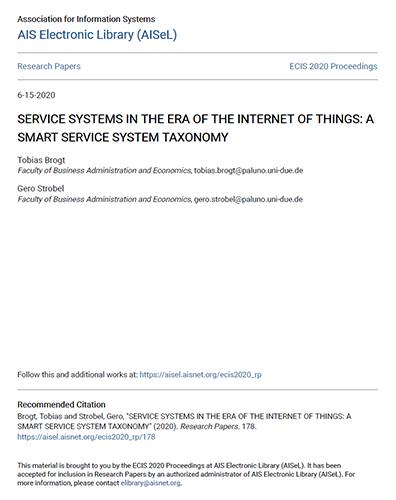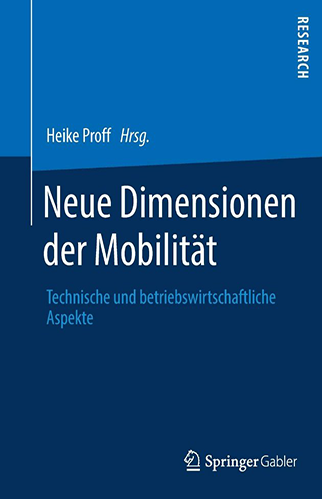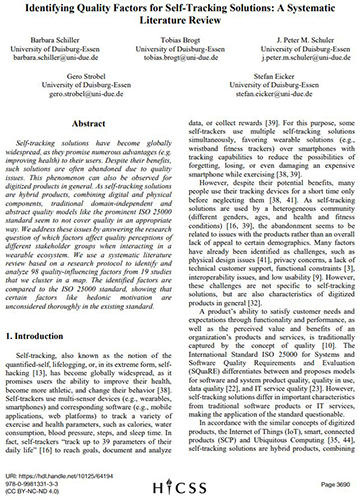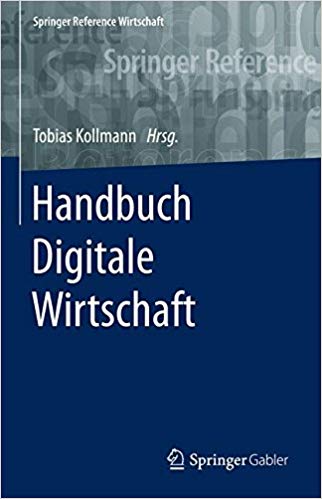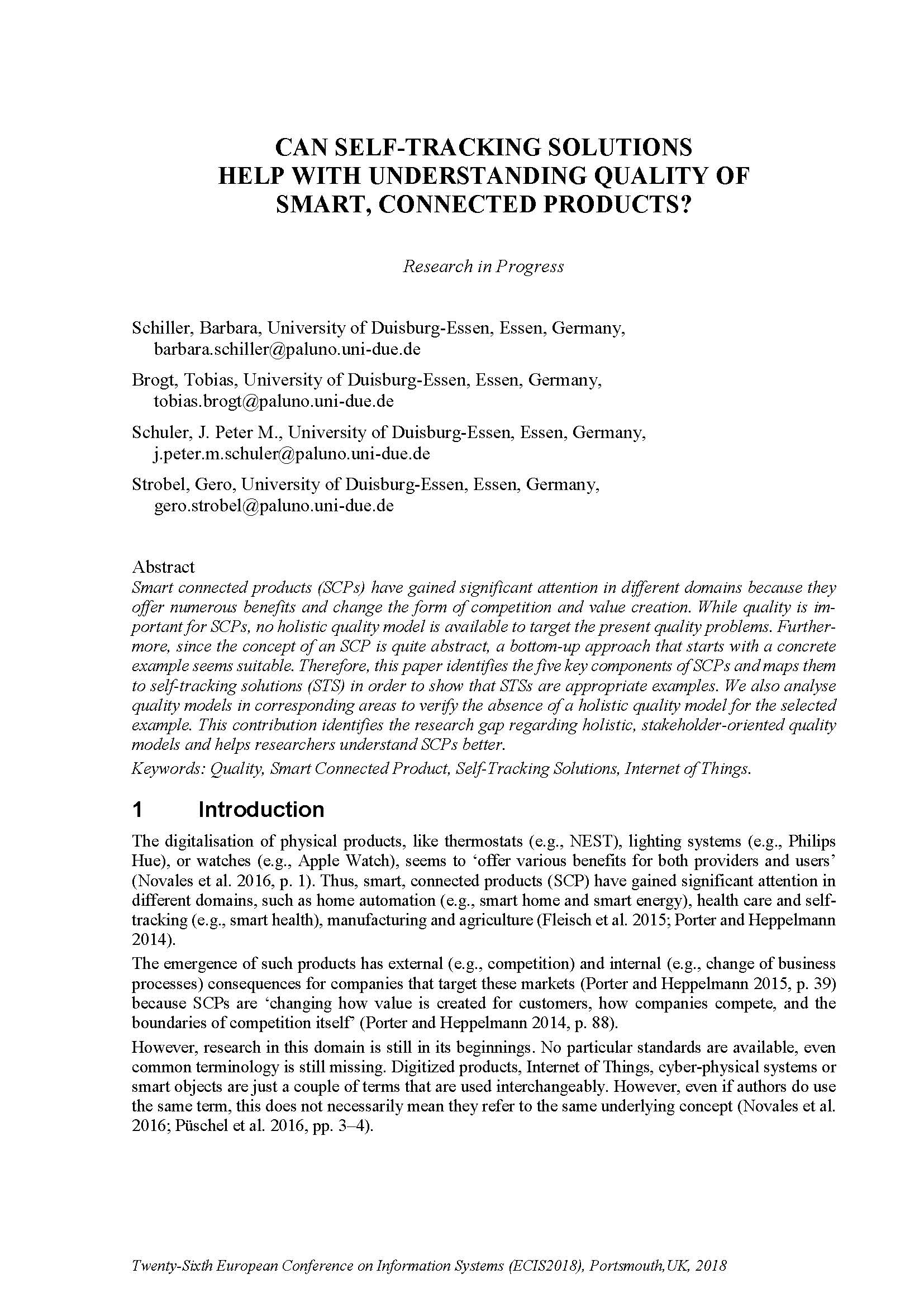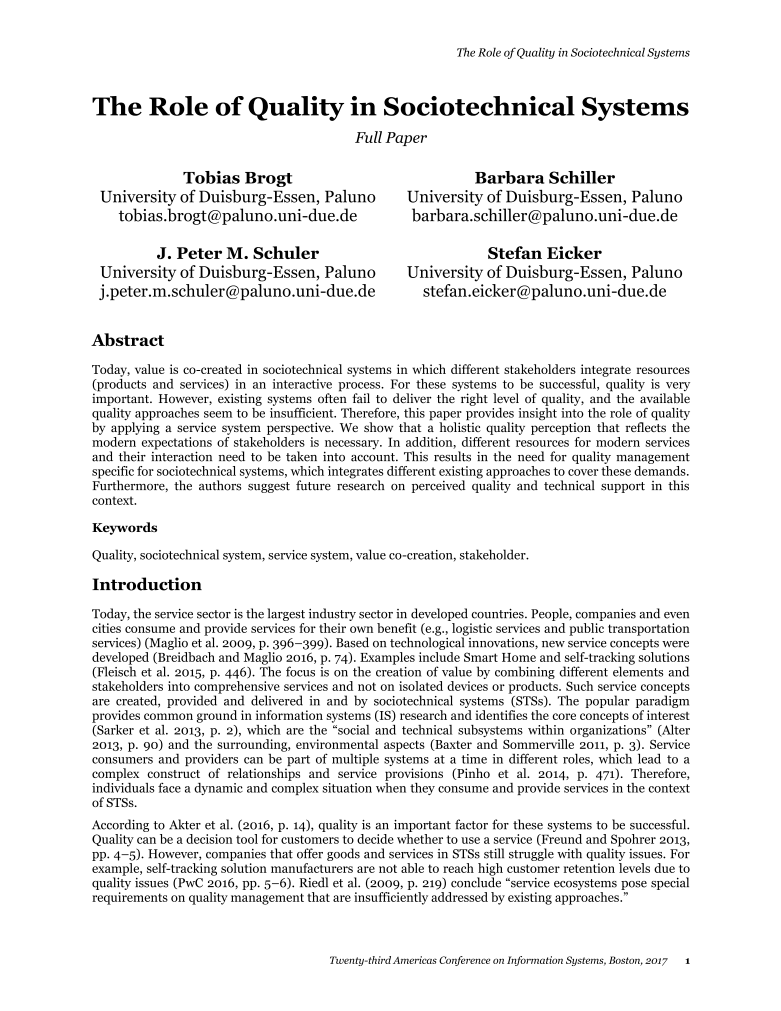Team

Externer Doktorand
Tobias Brogt, M. Sc.
- Telefon:
- +49 201 18-34031
- E-Mail:
- tobias.brogt (at) paluno.uni-due.de
- Sprechstunde:
- Nach Absprach
- Adresse:
- Universität Duisburg-Essen, Campus Essen
Fakultät für Wirtschaftswissenschaften
Lehrstuhl für Wirtschaftsinformatik und Softwaretechnik
Universitätsstr. 9
45141 Essen
Lebenslauf:
- Seit Oktober 2019: Dozent im Masterstudiengang Digital Business Innovation and Transformation (DBIT)
- Seit Oktober 2016: Dozent im Virtuellen Weiterbildungsstudiengang Wirtschaftsinformatik (VAWi)
- Seit August 2015: Software Engineer bei der IT-Objects GmbH
- Seit Dezember 2014: Wissenschaftlicher Mitarbeiter am Lehrstuhl für Wirtschaftsinformatik und Softwaretechnik (Lehrstuhlinhaber: Prof. Dr. Stefan Eicker) an der Universität Duisburg-Essen
- November 2013 - Februar 2014: Auslandssemester an der Siam University (MBA) in Thailand
- Oktober 2008 - Dezember 2014: Studium der Wirtschaftsinformatik (B. Sc. und M. Sc.) an der Universität Duisburg-Essen
Forschungsgebiete:
- Service Systems und Service Systems Engineering
- Vorgehensmodelle
- Smart Connected Products
- Architekturen
Projekte:
Entwurf und Entwicklung von smarten Produkten im Forschungsbereich Smarte Produkte
Publikationen:
- Eicker, Stefan; Strobel, Gero; Brogt, Tobias: Smart Service. In: Kollmann, T.; Kuckertz, A.; Stöckmann, C. (Hrsg.): Gabler Kompakt-Lexikon Unternehmensgründung. 3. Auflage. Springer Gabler, Wiesbaden, 2021. doi:10.1007/978-3-658-30901-5_19DetailsBIB Download
- Eicker, Stefan; Brogt, Tobias; Strobel, Gero: Smart Product. In: Kollmann, T.; Kuckertz, A.; Stöckmann, C. (Hrsg.): Gabler Kompakt-Lexikon Unternehmensgründung. 3. Auflage. Springer Gabler, Wiesbaden, 2021. doi:10.1007/978-3-658-30901-5_19DetailsBIB Download
- Brogt, Tobias; Strobel, Gero: Service Systems in the Era of the Internet of Things: A Smart Service System Taxonomy. In: AiS (Hrsg.): Proceedings of the 28th European Conference on Information Systems (ECIS). Marrakesh, Morocco, 2020. KurzfassungDetailsBIB Download
Services are becoming increasingly important, and service systems are seeing the use of service-dominant logic to understand value creation through the integration of active and passive resources. Digital transformation is significantly influencing service systems, and new, smart technologies are enabling innovative value propositions, leading to smart service systems. Smart products, which are a part of the Internet of Things, are the main building blocks of such systems. Attempts have been made to conceptualize smart service systems, but there seems to be no consensus in the literature because, for example, smart products have not been defined in a consistent way. We therefore examine ways to classify smart service systems in terms of their characteristics and attributes. We develop a taxonomy based on a systematic literature review focusing on smart features. Furthermore, an evaluation using domain-specific use cases demonstrates the applicability of the taxonomy. Our contribution combines and extends the available conceptualizations regarding smart service systems to pave the way for the necessary future research.
- Jonasson, Maurizio; Brogt, Tobias: Entwicklung eines Konzepts zur informationssystembasierten Unterstützung intermodaler Mobilitätsansätze. In: Proff, Heike (Hrsg.): Neue Dimensionen der Mobilität. Springer Gabler, Wiesbaden, 2020, S. 515-532. doi:10.1007/978-3-658-29746-6_42DetailsVolltextBIB Download
- Schiller, Barbara; Brogt, Tobias; Schuler, J. Peter M.; Strobel, Gero; Eicker, Stefan: Identifying Quality Factors for Self-Tracking Solutions: A Systematic Literature Review. In: Proceedings of the 53nd Hawaii International Conference on System Sciences. Hawaii, USA, 2020. doi:10.24251/HICSS.2020.452KurzfassungDetailsBIB Download
Self-tracking solutions have become globally widespread, as they promise numerous advantages (e.g. improving health) to their users. Despite their benefits, such solutions are often abandoned due to quality issues. This phenomenon can also be observed for digitized products in general. As self-tracking solutions are hybrid products, combining digital and physical components, traditional domain-independent and abstract quality models like the prominent ISO 25000 standard seem to not cover quality in an appropriate way. We address these issues by answering the research question of which factors affect quality perceptions of different stakeholder groups when interacting in a wearable ecosystem. We use a systematic literature review based on a research protocol to identify and analyze 98 quality-influencing factors from 19 studies that we cluster in a map. The identified factors are compared to the ISO 25000 standard, showing that certain factors like hedonic motivation are unconsidered thoroughly in the existing standard.
- Brogt, Tobias; Eicker, Stefan: Einsatz von Servicesystemen zur Umsetzung von Innovationen im Kontext der Digitalisierung. In: Kollmann, Tobias (Hrsg.): Handbuch Digitale Wirtschaft. Springer Gabler, Wiesbaden, 2019. doi:10.1007/978-3-658-17345-6_82-1KurzfassungDetailsVolltextBIB Download
Durch die Digitalisierung befinden sich Unternehmen oftmals in der Umstellung zu digitalen Geschäftsprozessen und Geschäftsmodellen. Dies bietet viele neue Chancen für Innovationen durch den Einsatz neuer Konzepte und Technologien. Um diese Chancen nutzbar zu machen, können Servicesysteme eingesetzt werden. Der Beitrag gibt einen Überblick über dieses Konzept und zeigt auf, wie Servicesysteme charakterisiert und entworfen werden können. Ein Servicesystem stellt ein soziotechnisches System dar, das auf die Unterstützung der gemeinsamen Wertschöpfung abzielt, indem verschiedene interne und externe Ressourcen integriert und kombiniert werden. Der Entwurf erfolgt im Rahmen des Service Systems Engineerings in meist agilen Prozessen mit dem Ziel einer frühen Markterprobung. Dabei kann der Innovationsgedanke explizit berücksichtigt werden. Vorhandene Entwurfsansätze sind jedoch meist abstrakt und daher weniger für den konkreten Entwurf geeignet. Es können daher wesentliche Faktoren identifiziert werden, die die Entwicklung von Servicesystemen beeinflussen. Der Beitrag schafft einen Überblick über den aktuellen Stand der Forschung und zeigt Ansatzpunkte für eine Verbesserung der Nutzbarmachung des Konzeptes Servicesystem.
- Schiller, Barbara; Brogt, Tobias; Schuler, J. Peter M.; Strobel, Gero: Can Self-Tracking Solutions Help with Understanding Quality of Smart, Connected Products?. In: Ais (Hrsg.): Proceedings of the 26th European Conference on Information Systems (ECIS). Portsmouth, 2018. KurzfassungDetailsBIB Download
Smart connected products (SCPs) have gained significant attention in different domains because they offer numerous benefits and change the way of competition and value creation. While quality is im-portant for SCPs, no holistic quality model is available to target the present quality problems. Further-more, since the concept of an SCP is quite abstract, a bottom-up approach that starts with a concrete example seems suitable. Therefore, this paper identifies the five key components of SCPs and maps them to self-tracking solutions (STS) in order to show that STSs are suitable substitutes. We also analyse quality models in corresponding areas to verify the absence of a holistic quality model for the selected example. This contribution identifies the research gap regarding holistic, stakeholder-oriented quality models and helps researchers understand SCPs better.
- Brogt, Tobias; Schiller, Barbara; Schuler, J. Peter M.; Eicker, Stefan: The Role of Quality in Sociotechnical Systems. In: Ais (Hrsg.): Proceedings of AMCIS 2017 - Twenty-third Americas Conference on Information Systems. Boston, 2017. KurzfassungDetailsVolltextBIB Download
Today, value is co-created in sociotechnical systems in which different stakeholders integrate resources (products and services) in an interactive process. For these systems to be successful, quality is very important. However, existing systems often fail to deliver the right level of quality, and the available quality approaches seem to be insufficient. Therefore, this paper provides insight into the role of quality by applying a service system perspective. We show that a holistic quality perception that reflects the modern expectations of stakeholders is necessary. In addition, different resources for modern services and their interaction need to be taken into account. This results in the need for quality management specific for sociotechnical systems, which integrates different existing approaches to cover these demands. Furthermore, the authors suggest future research on perceived quality and technical support in this context.
Vorträge:
- Brogt, Tobias; Strobel, Gero: Can Self-Tracking Solutions Help with Understanding Quality of Smart, Connected Products?. 26th European Conference on Information Systems (ECIS), 26.06.2018, Portsmouth, England.
- Brogt, Tobias: The Role of Quality in Sociotechnical Systems . 23rd Americas Conference on Information Systems (AMCIS), 10.08.2017, Boston. USA.
Lehrveranstaltungen:
- Fortgeschrittene Programmierkonzepte (Konzeption und Dozent der Vorlesung seit dem Wintersemester 2014/2015)
- Paradigmen und Konzepte der Softwareentwicklung (Konzeption und Dozent der Vorlesung seit dem Sommersemester 2015)
- Betreuung von Studienprojekten mit externen Kooperationspartner (seit dem Wintersemester 2015/2016)
- Betreuung von Seminararbeiten (seit dem Sommersemester 2017)
Begleitete Abschlussarbeiten:
- Homeoffice in Organisationen: Erarbeitung eines Frameworks für verteiltes Arbeiten (Bachelorarbeit Wirtschaftsinformatik, 2021)
- Analyse der Auswirkungen von Architekturen auf die Sicherheit im Internet of Things (Bachelorarbeit Wirtschaftsinformatik, 2021)
- Analyse der Innovationspotenziale von IoT-Plattformen in der Automobilbranche (Bachelorarbeit Wirtschaftsinformatik, 2021)
- Entwurf einer Vorgehensweise zur Modernisierung langfristiger Softwareentwicklungsprojekte (Masterarbeit Wirtschaftsinformatik, 2020)
- Architekturen für smarte Produkte: Earbeitung eines Ansatzes auf Basis der Identifikation und Analyse bestehender Konzepte (Masterarbeit Wirtschaftsinformatik, 2020)
- Einsatz von Managed Services: Konzeption eines Frameworks zur Entscheidungsunterstützung im Unternehmen (Masterarbeit Wirtschaftsinformatik, 2020)
- Erarbeitung eines Konzepts für die Unterstützung der Krankentransportorganisation (Bachelorarbeit Wirtschaftsinformatik, 2020)
- Identifikation und Analyse von Entwurfprozessen für smarte Produkte (Masterarbeit Wirtschaftsinformatik, 2020)
- Prototypische Konzeptionierung einer universellen Smart Home Applikation (Bachelorarbeit Wirtschaftsinformatik, 2019)
- Entwicklung eines Konzepts zur informationssystembasierten Unterstützung intermodaler Mobilitätsansätze (Masterarbeit Wirtschaftsinformatik, 2019)
- Einführung von Smart Services im Zahlungsverkehr: Identifikation von Voraussetzungen und Herausforderungen (Bachelorarbeit Wirtschaftsinformatik, 2019)
- Entwurf eines Vergleichsrahmens zur Kategorisierung und Bewertung von Kryptowährungen auf Basis ihrer funktionalen und technologischen Eigenschaften (Masterarbeit Wirtschaftsinformatik, 2019)
- Beschreibung der Vorgehensweise und Identifikation von Herausforderungen bei der Einführung von Continous Integration (Bachelorarbeit Wirtschaftsinformatik, 2018)
- Evaluation plattformunabhängiger Entwicklungsmethoden zur Erstellung mobiler Applikationen (Masterarbeit Wirtschaftsinformatik, 2018)
- Einsatz von künstlichen neuronalen Netzen zur Datenverarbeitung auf dezentralen Gateways für Internet-of-Things-Architekturen - Design Science Research am Beispiel von SAPs Internet of Things Gateways (Masterarbeit Wirtschaftsinformatik, 2018)
- Konzeptionierung einer workflowbasierten Software für die Musikproduktion im Heimstudiosektor (Masterarbeit Wirtschaftsinformatik, 2018)
- Analyse ausgewählter Konzepte der modernen Softwareentwicklung (Bachelorarbeit Wirtschaftsinformatik, 2018)
- Analyse des Potenzials eines gemeinsamen Einsatzes von DevOps und Cloud Computing (Bachelorarbeit Wirtschaftsinformatik, 2018)
- Bewertung von Vorgehensmodellen zur Softwareentwicklung im Kontext der Digitalisierung (Bachelorarbeit Wirtschaftsinformatik, 2018)
- Anwendungsmöglichkeiten und –risiken der Blockchain im Web 3.0 (Bachelorarbeit Wirtschaftsinformatik, 2018)
- Analyse der Eignung der Container-Technologie zur Beherrschung der Komplexität zwischen Anwendung und Betriebssystem in Informationssystemen (Masterarbeit Wirtschaftsinformatik, 2018)
- Sicherheit im Smart Home: Analyse und Vergleich der Kommunikationsstandards (Bachelorarbeit Wirtschaftsinformatik, 2018)
- Analyse ausgewählter Frameworks for Scaling Scrum in Software Development Projects (Bachelorarbeit Betriebswirtschaftslehre, 2018)
- Entwicklung eines Modells zur Bestimmung des Digitalisierungsgrades von Dienstleistungsunternehmen (Masterarbeit Wirtschaftsinformatik, 2018)
- Mobile App Portfolio Management: Analyse des praktischen Einsatzes anhand eines Fallbeispiels (Bachelorarbeit Wirtschaftsinformatik, 2018)
- Evaluation hybrider Vorgehensmodelle für die Softwareentwicklung (Bachelorarbeit Wirtschaftsinformatik, 2018)
- Analyse der Kombinationsmöglichkeiten von klassischen und agilen Projektmanagementansätzen zur erfolgreichen Durchführung von IT‐Projekten (Masterarbeit Wirtschaftsinformatik, 2018)
- Analyse der Auswirkungen auf die Zusammenarbeit zwischen IT-Entwicklung und IT-Betrieb durch den Einsatz von Containertechnologien und Microservices (Bachelorarbeit Wirtschaftsinformatik, 2018)
- Erarbeitung eines Kriterienkatalogs zur Beurteilung des Risikopotentials von IT-Projektportfolios (Bachelorarbeit Wirtschaftsinformatik, 2018)
- Analyse der Auswirkungen moderner Konzepte auf die Qualität in der Softwareentwicklung (Bachelorarbeit Wirtschaftsinformatik, 2018)
- Smart Home im Neubau: Analyse und Bewertung vorhandener Standards (Bachelorarbeit Wirtschaftsinformatik, 2018)
- Kryptowährungen als alternatives Zahlungsmittel: Identifikation von Chancen und Risiken (Bachelorarbeit Wirtschaftsinformatik, 2018)
- Identifikation der domänespezifischen Einsatzpotenziale der Blockchain-Technologie (Bachelorarbeit Wirtschaftsinformatik, 2018)
- Developing Software for the Internet of Things - An Evaluation of Software Development Models and their Quality Assurance Capabilities (Masterarbeit Wirtschaftsinformatik, 2018)
- Improving Service Delivery through the Use of Service Systems: Identifying Integration Requirements and Challenges (Masterarbeit Wirtschaftsinformatik, 2018)
- Entwicklung eines Ansatzes zur Einführung und zum Management von Crowdsourcing in Software-Projekten (Masterarbeit Wirtschaftsinformatik, 2017)
- Konzeption und Implementierung einer Datenintegration für ein cloudbasiertes Projektmanagement‐System in einem mittelständischen IT‐Unternehmen (Masterarbeit Wirtschaftsinformatik, 2017)
- Bereitstellung von mobilen Inhalten im Unternehmenskontext mit Progressive Web Apps: Analyse der Potentiale und Herausforderungen (Bachelorarbeit Wirtschaftsinformatik, 2017)
- Analyse des Einsatzes von Softwareentwicklungskonzepten in der agilen Softwareentwicklung (Bachelorarbeit Wirtschaftsinformatik, 2017)
- Softwareentwicklungskonzepte im Bereich DevOps: Analyse der Auswirkungen auf die Qualität des Softwareprodukts (Bachelorarbeit Wirtschaftsinformatik, 2017)
- Development of a Hybrid Process Model - Combining Plan Driven and Agile Advantages (Masterarbeit Wirtschaftsinformatik, 2017)
- Analyse der Einsatzmöglichkeiten von Methoden der Wirtschaftsinformatik für die Gestaltung von cyber physischen Systemen (Bachelorarbeit Wirtschaftsinformatik, 2017)
- Analyse der Auswirkungen des DevOps-Ansatzes auf agile Methoden der Softwareentwicklung (Bachelorarbeit Wirtschaftsinformatik, 2017)
- Erarbeitung von Handlungsempfehlungen zur Berücksichtigung von Co-Creation und Digitalisierung in Dienstleistungen der Automobilindustrie am Beispiel Carsharing (Bachelorarbeit Wirtschaftsinformatik, 2017)
- Analyse von Anforderungen an das Qualitätsmanagement im Kontext von Industrie 4.0 (Bachelorarbeit Wirtschaftsinformatik, 2017)
- Identifikation von strategischen Erfolgsfaktoren für Unternehmen im Zeitalter von Industrie 4.0 (Bachelorarbeit Wirtschaftsinformatik, 2017)
- Erarbeitung von Handlungsempfehlungen für die Servicetransformation produktorientierter Unternehmen (Bachelorarbeit Wirtschaftsinformatik, 2017)
- Servicesysteme in der digitalen Transformation: Erarbeitung von Handlungsempfehlungen für produktorientierte Unternehmen (Bachelorarbeit Wirtschaftsinformatik, 2017)
- Identifikation der Auswirkungen des Open Innovation Einsatzes im Service Systems Engineering (Bachelorarbeit Wirtschaftsinformatik, 2017)
- Identifikation von Nutzungspotenzialen des Big Data-Einsatzes in der interaktiven Wertschöpfung in Service Systemen (Bachelorarbeit Wirtschaftsinformatik, 2017)
- Ein Ansatz zur Qualitätsverbesserung von Dienstleistungen im Service Engineering durch Big Data am Beispiel von Social Media (Bachelorarbeit Wirtschaftsinformatik, 2016)
- Identifikation von Unterstützungspotentialen für dienstleistungsorientierte Geschäftsmodelle in Service Systemen (Bachelorarbeit Wirtschaftsinformatik, 2016)
- Schaffung der Grundlagen für die Entwicklung einer konsistenten Logik und Sprache für Service Systeme (Bachelorarbeit Wirtschaftsinformatik, 2016)
- Analyse von Automatisierungspotenzialen in Wartung und Betrieb von Informationssystemen durch den Einsatz wissensbasierter Systeme (Bachelorarbeit Wirtschaftsinformatik, 2016)
Inneruniversitäre Funktionen:
- Dozent beim Connect Workshop im Sommersemester 2016
- Mitarbeit an der Web-Content-Management-Lösung der Fakultät "WIWI-chairT3"

